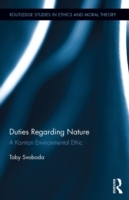In this book, Toby Svoboda develops and defends a Kantian environmental virtue ethic, challenging the widely-held view that Kant's moral philosophy has little to offer environmental ethics. On the contrary, Svoboda contends that on Kantian grounds, there is good moral reason to care about non-human organisms in their own right and to value their flourishing independently of human interests, since doing so is constitutive of certain (environmental) virtues. Svoboda argues that Kant's account of indirect duties regarding nature can ground a compelling environmental ethic: the Kantian duty to develop morally virtuous dispositions strictly proscribes unnecessarily harming organisms, and it also gives us moral reason to act in ways that benefit such organisms. Svoboda's account engages the recent literature on environmental virtue (including Rosalind Hursthouse, Philip Cafaro, Ronald Sandler, Thomas Hill, and Louke van Wensveen) and provides an original argument for an environmental ethic firmly rooted in Kant's moral philosophy.

